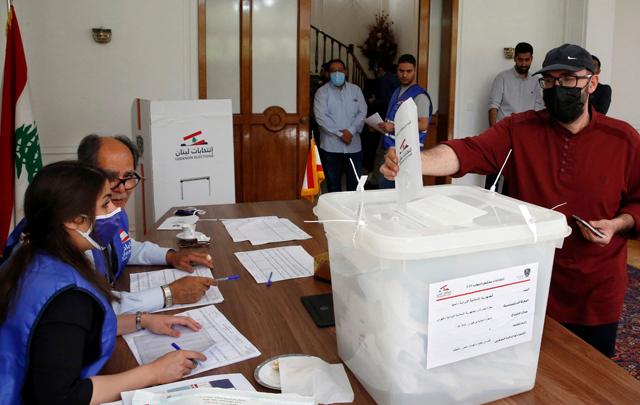
BEIRUT, (Reuters) – More than 100,000 Lebanese living abroad cast ballots for parliamentary electionson Friday and Sunday, many backing political newcomers after the worst crisis since Lebanon’s 1975-90 civil war led to widespread poverty and a wave of emigration. Some225,000 Lebanese living overseas were eligible to participate in the elections in more than 50 countries, the first since Lebanon’s 2019 financial collapse and the port blast that killed more than 215 people and destroyed large parts of Beirut in August, 2020. Overall turnout in overseas voting was around 60%, foreign ministry official Hadi Hachem told Reuters, or some 130,000 people. That is roughly three times as many as during the last polls, in 2018.
Observers expect large numbers of expatriates to vote for candidates from a coalition of activists and independents who gained prominence during 2019 protests against the sectarian political elites whose corruption and mismanagement is widely blamed for the country’s catastrophic collapse. “I want change,” said Samer Sobbi, a truck driver voting in Sydney on Sunday. “I don’t want the same people, the same people every four years, and if not the same people then their kids, if not their kids, their relatives. What about us?” Australia is among those countries with the highest number of Diaspora voters, alongside Canada, the United States, Germany, the United Arab Emirates. France has the most at around 28,000 eligible voters.
Turnout in Australia closed at 55%, while in the UAE more than 70% of eligible voters cast their ballots, one of the highest turnouts registered. The queue outside the Lebanese consulate in Dubai stretched for roughly a kilometre despite sweltering heat, and local police were seen fanning voters with pieces of cardboard. “I came today just to vote and don’t care how long we wait in the heat. We need change,” said first-time voter Christiane Daou, 37.
Another longtime Dubai resident Joyce Daou (unrelated) expressed fears harboured by many voters that their votes may not be counted or could be otherwise interfered with — claims that have been denied by officials. The ballot papers will be shipped back to Lebanon and stored at the central bank before being counted on election day. In parliamentary elections in 2018, the Lebanese Association for Democratic Elections, the main elections watchdog, deemed as “invalid” results from 479 overseas polling stations, with no explanation given by officials. “We are doing our part (by voting). Hopefully they will do their part and do not change the votes and leave this process to remain democratic and accurate,” Joyce Daou said.
Support for establishment parties was still evident; near the Berlin polling centre, more than 20 people chanted their backing for Nabih Berri, the veteran speaker of Lebanon’s parliament. Others disagreed. Anton Wehb, a 62-year-old construction worker voting in Sydney, said Lebanon needed “new blood”, while in Paris, voter Sahar al-Jazzar said she would cast her ballot for “someone who wasn’t in power before.” “Enough oppression, enough injustice and all the suffering we lived,” she said.
Reporting by Stefica Nicol Bikes and Jill Gralow in Sydney, Muath Freji in Dubai, Clotaire Achi and Florent Bardos in Paris and Timour Azhari in Beirut; Writing by Timour Azhari; Editing by Catherine Evans, Raissa Kasolowsky and Ed Osmond Our Standards: The Thomson Reuters Trust Principles.
انتخابات المغتربين.. تفوّق “التغييريين” وتعادل الأحزاب
حاطت انتخابات المغتربين بروباغندا اعلامية بكل اتجاه، ضيّعت الناخبين المقيمين. فهل ترك مشهد الاغتراب اثراً على الناخبين المقيمين؟ elnashra.com —
اذا كان مشهد الامارات العربية المتحدة عربياً، والمانيا غربيّاً سرق الأضواء، فإنّه يمكن التدقيق بما هو ابعد من الاستعراضات الانتخابية.
تعود نسبة ارتفاع المشاركة الانتخابية للمغتربين اللبنانيين في الامارات العربية الى عاملين:
اولاً، حرية خيار الناخب اللبناني نفسياً، من دون وجود ضغوط معنوية وشائعات، بسبب التوجهات السياسية.
ثانياً، اندفاعة المغتربين نحو اختيار مرشحي “قوى التغيير”.
واذا كان الاستعراض الذي مارسته ماكينة حركة أمل في المانيا، شد انظار الناخبين اللبنانيين اليها، بإعتبارها “قلعة حركية”، فإن نسبة المشاركة فيها أتت جيدة 53٪، لكنها لم تحمل مفاجآت ولم تُشر الى متغيرات، كأن تتخطى نسبة 70% مثلاً.
ومن خلال التدقيق بنسب مشاركة المغتربين في الدول الأخرى، يمكن ملاحظة ان الانتخاب في اوستراليا وصل الى مستوى 55%، في وقت كانت توحي فيه جهوزية حزب القوات ان مغتربي اوستراليا سيشاركون بنسبة لن تنخفض عن 75%.
وكانت بعض وسائل الاعلام تشير الى تفوّق القوات في اوستراليا، علماً ان احزاب اخرى كانت موجودة بثقل انتخابي، وخصوصاً تياري “المردة” و”الوطني الحر” والحزب السوري القومي الاجتماعي.
اما القارة الافريقية فعكست المشهد اللبناني، حيث بلغت نسبة المشاركة فيها حوالي 50%، بينما كان يعاني “الثنائي الشيعي” من عدم وجود حماسة انتخابية بسبب غياب التجاوب مع تمنيات الثنائي المذكور، نتيجة خسارات اللبنانيين المغتربين هناك لأموالهم في المصارف اللبنانية، لكن “أمل” نجحت في رفع نسبة المشاركة الى هذا الحد، فذهبت معظمها الى لوائح “الأمل والوفاء” مع وجود وازن للوائح “قوى التغيير”.
بالاجمال يمكن من خلال الرصد والقراءة، تسجيل ملاحظات عدّة:
– تعادل الاحزاب التقليدية في عملية جذب الناخبين المغتربين:
تفوقت القوات نسبياً في اوستراليا، لكن قوى التغيير والاحزاب الاخرى نافستها في “قلعتها” الاغترابية.
تفوقت حركة امل في المانيا، لكن قوى التغيير نافست لوائح “الأمل والوفاء”.
– تقدمت لوائح “قوى التغيير” في دول الخليج العربي، بشكل واضح، مع ميل الناخبين المسيحيين في السعودية نحو لوائح القوات، وتعادل القوى السياسية بما حصلت عليه في قطر والكويت والامارات.
– تقدم قوى “8 آذار” في سوريا التي بلغت فيها نسبة الاقتراع 84%، وايران.
– تعادل في فرنسا بين القوى السياسية، بينما تقدمت “قوى التغيير” على باقي اللوائح.



